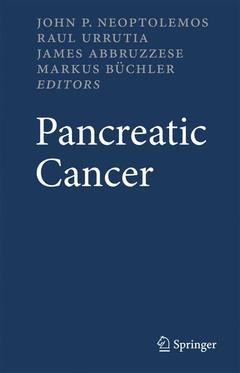Pancreatic Cancer
Auteur : Neoptolemos John P.

This handbook details advances in pancreatic cancer research that have a profound and lasting impact on the field. It features the work of authors who are the very best in their respective fields and will have widespread appeal among clinicians, pathologists and basic scientists who are now struggling to understand this complex and rapidly expanding field.
Section One: The Nature of Pancreatic Cancer
- Epidemiology: world overview, risk factors, prospects for prevention
- Development and structure of pancreas
- Pathologic classification and biological behaviour of pancreatic neoplasia
- Developmental molecular biology of the pancreas
- Molecular pathology of precursor lesions of pancreatic cancer, pancreatic intraepithelial neoplasia (PanIN), intraductal papillary mucinous neoplasm (IPMN), and mucinous cystic neoplasm (MCN)
- Epigenetics: its fundamentals and applications to a revised comprehensive progression model for pancreatic cancer
- Molecular pathology of pancreatic neuroendocrine tumours MEN-1: gastrinomas, insulinoma, Non-Functioning Tumours, VIPoma, glucagonoma, Von Hippel-Lindau, Neurofibromatosis
- Sporadic neuroendocrine pancreatic tumours
- Molecular pathology of non-pancreatic cancer lesions: Ampullary cancer, intra-pancreatic bile duct cancer, and duodenal cancer
- Miscellaneous non-pancreatic non-endocrine tumours
- Novel molecular relationships between chronic pancreatitis and cancer
- Pancreatic cancer stem cells
- Cell cycle control: signalling pathways in pancreatic pathogenesis
- Apoptosis: signalling pathways in pancreatic pathogenesis
- EGFR: signalling pathways in pancreatic pathogenesis Pl3, Akt, lKK, Ras, Raf, MAPKK, ERK
- Hedgehog: signalling pathways in pancreatic pathogenesis
- Smad4/TGF-ß pathway: signalling pathways in pancreatic pathogenesis
- Notch signalling in pancreatic morphogenesis and pancreatic cancer
- Molecular characterization of pancreatic cell lines
- Mouse models of exocrine pancreatic cancer
- Principles and applications of microarray gene expression in pancreatic cancer
- Principles and applications of proteomics in pancreatic cancer
- Tumour-stromal interaction: invasion and metastases
- Genetic susceptibility, high risk groups, chronic and hereditary pancreatitis, familial pancreatic cancer syndromes
- Inherited endocrine pancreatic tumors associated with Multiple Endocrine Neoplasia Type 1 Von-Hippel-Lindau Syndrome, and Neurofibromatosis Type 1
- Clinical decision making in pancreatic cancer
- Paraneoplastic syndromes
- Diagnostic and therapeutic response markers
- CT and fusion PET-CT Diagnosis, staging, and follow-up
- MRI and MRCP: diagnosis and staging of pancreatic cancer
- EUS Diagnosis and staging
- Laparoscopy and laparoscopic ultrasound: diagnosis and staging
- Overview of palliative management for pancreatic cancer
- Endoscopy.
- Interventional radiology
- Role of palliative surgery in advanced pancreatic cancer
- Chemotherapy for advanced pancreatic cancer
- Developments in chemoradiation in advanced pancreatic cancer
- Surgical resection for pancreatic cancer
- Role of venous resection in pancreatic cancer surgery
- Pathological reporting and staging following resection
- Japanese Pancreas Society staging for pancreatic cancer
- Adjuvant chemotherapy in pancreatic cancer
- Case for adjuvant chemoradiation therapy for pancreatic cancer
- Case for neoadjuvant treatment in pancreatic cancer
- Borderline resectable disease
- Management of cystic neoplasms serous cystic neoplasms mucinous, cystic neoplasms, intraductal paillary mucinous neoplasms
- Laparoscopic surgery for pancreatic neoplasm
- Modern Japanese approach to pancreas cancer
- Development of novel biomarkers
- Inherited genetics of pancreatic cancer and secondary screening
- Gene therapy for pancreatic cancer
- Vaccine therapy and immunotherapy
- Emerging targets in pancreatic cancer
Section Two: Clinical Management of Pancreatic Cancer
Section Three: New Directions
The only Major Reference Work devoted entirely to pancreatic cancer
The contributing authors to this book are the very best in their respective fields
Will have widespread appeal among clinicians, pathologists, and basic scientists who are now struggling to understand this complex and rapidly growing field
Date de parution : 12-2012
Disponible chez l'éditeur (délai d'approvisionnement : 15 jours).
Prix indicatif 1075,05 €
Ajouter au panier


